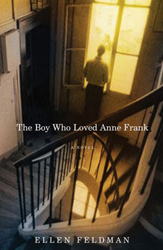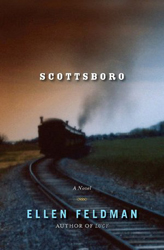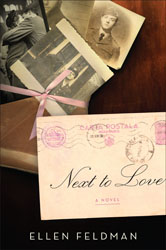Join a community of readers who are committed to Jewish stories
Sign up for JBC’s Nu Reads, a curated selection of Jewish books delivered straight to your door!
This week, Ellen Feldman, the author of several books, blogs for The Postscript on her thoughts about being a Jewish writer. The Postscript series is a special peek “behind the scenes” of a book. It’s a juicy little extra something to add to a book club’s discussion and a reader’s understanding of how the book came together.
To “host” Ellen at your next book club meeting, request her through JBC Live Chat.
Recently, when talking to a women’s group of a New York City temple, one of the members asked if my next book would have a Jewish theme. Before I could answer, another woman said, “Of course, it will. She’s a Jewish writer.”
I dislike being pigeonholed as a writer. I abhor the term woman writer.  I write differently from a man, but I also write differently from women writers who have experiences, backgrounds, temperaments, and passions unlike mine. I detest the term historical fiction writer. I write novels about individuals and the times in which they live, but these stories reflect my own struggles with the issues of the era in which I write. And I’m not fond of the term Jewish writer, because I think it implies that I am interested only in Jewish stories and that only Jews will be interested in the stories I tell.
I write differently from a man, but I also write differently from women writers who have experiences, backgrounds, temperaments, and passions unlike mine. I detest the term historical fiction writer. I write novels about individuals and the times in which they live, but these stories reflect my own struggles with the issues of the era in which I write. And I’m not fond of the term Jewish writer, because I think it implies that I am interested only in Jewish stories and that only Jews will be interested in the stories I tell.
Nonetheless, I am Jewish, and I won’t for a moment deny that my being Jewish informs everything I write. My most pointedly Jewish book is The Boy Who Loved Anne Frank. It is the story of a specific American post-Holocaust experience, but it is also my own story of growing up Jewish in a particular time and place.

When I decided to write Scottsboro, I wanted to explore the horror of racism in America, but the fact that anti-Semitism mingled with racism in a virulent brew that exploded across the country and around the world like a Molotov cocktail made the story both more horrible and more personal to me. When I began writing my most recent novel, Next To Love, I was not thinking about particular Jewish experiences. The novel is based on the stories with which I grew up, and many of the characters reflect people I knew or heard about. But once again, my Jewishness intruded, and an important subplot of the book is the way Jews were treated and the strides they made in post-World-War-II America. 
My new book, The Unwitting, which will be published in the spring of 2014, did not begin as a Jewish novel, but I found the story made emotional sense only if one of the main characters was a Jew. I suspect the fact was in the back of my mind before it reached the page.
Often novelists don’t know what they’re really writing about until they’re well into the book. They know plot and character, setting and scenes, but they may not recognize the underlining passion or hunger that is driving them to write that particular book. At least that has been my experience. I don’t set out to write books with Jewish themes, but that is frequently the result because my experiences are Jewish, my world view is Jewish, and the blood that begins to pulse faster when I get excited about telling a story is Jewish. Officially, I think of myself as a writer who happens to be Jewish, but I have a feeling my subconscious thinks of herself as a Jewish writer.
Ellen Feldman, a 2009 Guggenheim fellow, is the author of Terrible Virtue, The Unwitting, Next to Love, Scottsboro (shortlisted for the Orange Prize), The Boy Who Loved Anne Frank (translated into nine languages), and Lucy. Her last novel, Terrible Virtue, was optioned by Black Bicycle for a feature film.